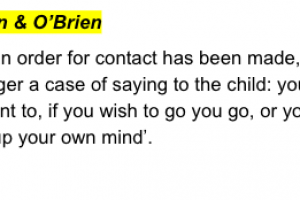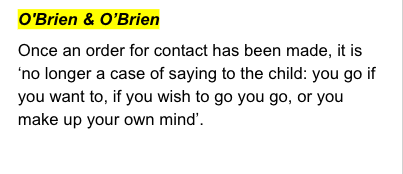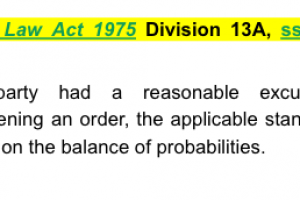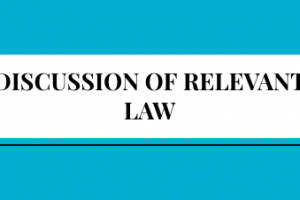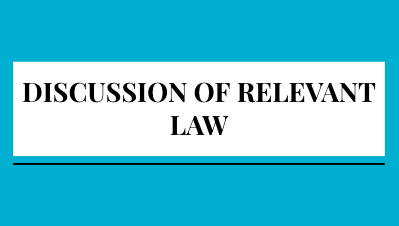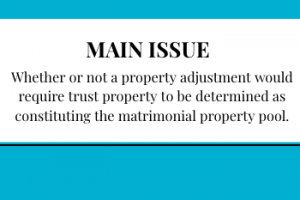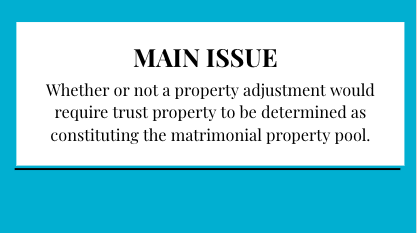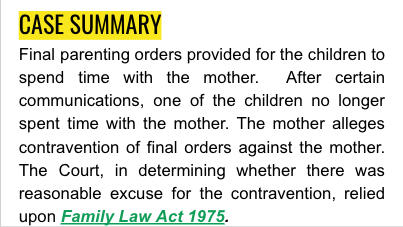- · 4845 friends
Mother Alleges Contravention of Parenting Orders Against Father

Lewis & Mitchell [2022] FedCFamC2F 771 (16 June 2022)

Final parenting orders provided for the children to spend time with the mother. After certain communications, one of the children no longer spent time with the mother. The mother alleges contravention of final orders against the father. The Court, in determining whether there was a reasonable excuse for the contravention, relied upon Family Law Act 1975.

Facts:
On 15 April 2021, final parenting orders were made by consent (“the final orders”) in proceedings between the father Mr. Lewis (“the father”), and the mother Ms. Mitchell (“the mother”). The final parenting orders concerned X born in 2006 and Y born in 2007 (collectively “the children”). Prior to the making of the final orders, there had been previous parenting orders which provided that the children live primarily in the mother’s care and spend time with the father (“the original orders”). The final orders made provision for the mother’s time with the children. In the Application for Contravention, it is alleged by the mother that on three occasions the father contravened the final orders.
Until 18 July 2021, Y spent time with her mother without any relevant difficulty and in accordance with the final orders. Further, the parties’ respective cases disclose without contest that on 18 July 2021 certain communications and circumstances arose, after which Y no longer spent time with the mother. On 30 September 2021, the father filed an Application for Final Orders and an Application in a Proceeding. The effect of both applications is to seek suspension of the final orders concerning Y spending time with her mother, on an interim and final basis.
The father’s Application in a Proceeding seeking interim orders and the mother’s contravention application were listed for hearing at the same time on 18 May 2022. A Child Impact Report had been prepared by a Court Child Expert dated 7 February 2022, but despite the views and recommendations, she expressed the parties had not been able to reach an agreement in relation to the disposition of the various applications. Both parties relied on parts of this report during submissions made by their counsel and it was received in evidence.
Senior counsel for the father raised the particulars of contravention alleged by the mother and observed that there appeared to be a clerical error in paragraphs 8 and 10 of the contravention application. Without opposition, an order was made that the contravention application be amended so that it particularised the alleged contraventions of (a) Paragraph 4(a)(ii) of the final orders on 22 July 2021 at 4:00 pm; and (b) Paragraph 4(a)(i) of the final orders on 28 July 2021 and 30th of July 2021 at 4:00 pm. The parties considered the option of the Court adjudicating on the Contravention application, but adjourning the father’s Application in a Case to the next day for the conduct of a judicial settlement conference.
The Court made orders on the Contravention Application on 18 May 2021 after hearing submissions from each counsel. On 19 May 2021 after the Judicial Settlement Conference, the Court made interim orders by consent. The Court received a plea of guilty on behalf of the father through his counsel in respect of all three counts alleged on the basis that the contraventions were said to be on the basis of reasonable excuse.

Issue:
Whether or not the contraventions were with a reasonable excuse.

Applicable law:
Family Law Act 1975 Division 13A, ss 70NAE, 70NAF - provides that if a party had a reasonable excuse for contravening an order, the applicable standard of proof is on the balance of probabilities.



Analysis:
The text messages between Y and the stepmother set in train the tension between Y and the mother and related distress that each experienced over the question of when changeover should occur. The distress and tension and Y’s interpretation of the interactions with the mother then caused Y’s subsequent refusal to cooperate with the father to attend changeovers on 22, 28, and 30 July 2021 to spend time with the mother.
The evidence of the father and the stepmother about what the child said had caused her refusal to spend time with the mother after 18 July 2021, which was similarly reported to the Court Child Expert by Y, may also have played a contribution. However, these reports are inevitably influenced by the child’s own distress and confusion. Also, her perception of what the mother had said and done, probably influenced by her knowledge of the views of the father and stepmother about the disagreement and that of her mother, which placed her in between the conflict.
The father was obliged to recognise and admit immediately that his actions and those of the stepmother triggered and caused the distress that arose between Y and the mother. Had he done so, he ought to have been able to communicate with and encourage Y to spend time with the mother and with a likely effect of Y not refusing to spend time with the mother.
After Y’s first refusal to spend time with the mother on 22 July 2021, it ought to have been apparent to the father that Y’s reason for refusal needed to be proactively addressed. It also ought to have been apparent that in addressing this he and the stepmother ought to have taken and admitted responsibility for their part in causing the disagreement, confusion, and distress to Y and the mother on 18 July 2021.
There is only generalised evidence about Y’s refusal to spend time with her mother. The father’s evidence was not persuasive and lacked sufficient detail about what reasonable actions he took to ensure compliance with the orders on the latter two occasions on 28 and 30 July 2021.
Conclusion:
Leave is granted to the Mother to amend paragraphs 8 and 10 of the Contravention Application filed 9 August 2021, to refer to 4(a)(i). HBC1025/2021 (Mitchell & Lewis) should be listed for a Judicial Settlement Conference in respect of the Application in a Proceeding filed 30 September 2021 before Judge Taglieri at 9.30 am on 19 May 2022. The Respondent is to enter into a bond to be on good behaviour for six months, the final written terms of which are to be determined and commencing on 19 May 2022.


